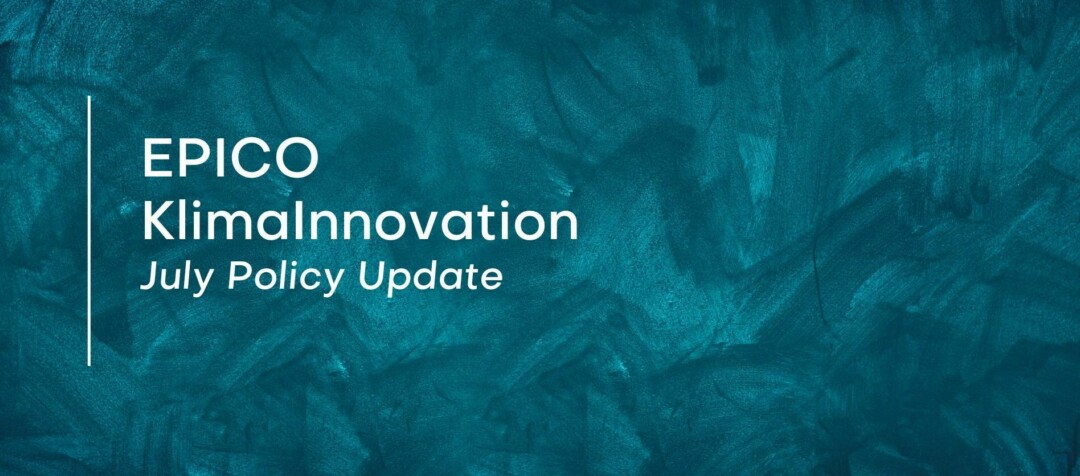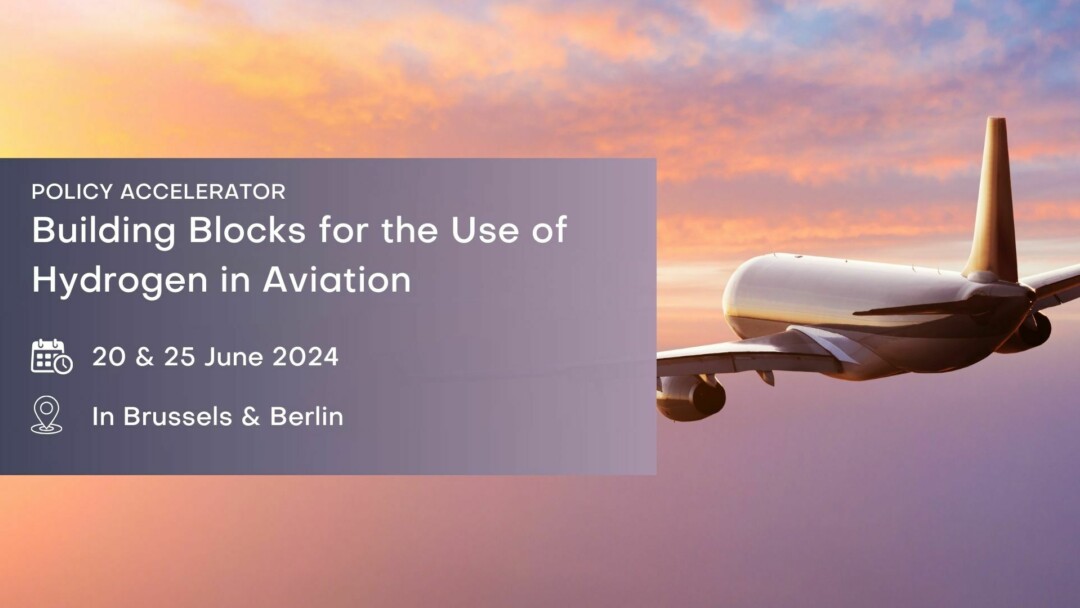
Navigating Post-Election EU: Green Deal 2.0, Germany’s Flexibility Gap, and Decarbonising Key Sectors
EPICO KlimaInnovation is a non-profit and independent energy and climate policy think tank providing a platform and network for policy development. In our Monthly Policy Update, we dive into the latest and most relevant developments in energy and climate policy and share the outcomes of our events and publications.
Green Deal and competitiveness: Our recommendations for the next policy cycle
With a few days to go until the first plenary of the new European Parliament, the new legislative period is officially underway. But, the results of the June European Elections, marked by the rise of climate denialist coalitions, compel us to reassess Europe's future role in the global energy transition.
Europe’s newly elected representatives face a critical challenge: preventing the rollback of EU climate policies in this upcoming policy cycle. The traditional “business-as-usual” approach to the Green Deal will no longer be enough. The European Union needs a Green Deal 2.0 that can combine climate ambitions with competitiveness and economic goals.
At the beginning of July, EPICO published a paper that provides Brussels’ new policymakers with a toolbox for a competitive industrial agenda for Europe. The Strategy Paper is personally supported by members of EPICO’s Advisory Board, including politicians, heads of companies and associations, leading economists, trade unions, and NGOs.
The Paper emphasises the need to complement the Green Deal with market-oriented measures and puts forward six recommendations:
- Scaling up the internal market
- Enhancing effective integration for the energy transition
- Think local, act European: Innovating energy infrastructure
- Pushing the boundaries: Global collaboration for industrial decarbonisation
- EU lead markets: Creating definitions and transforming public procurement
- Structuring the EU’s industrial hydrogen uptake
Read EPICO’s Advisory Board Chairman, Andreas Jung’s key takeaway:
Europe must now take decisive steps towards a genuine Energy Union. A powerful industrial agenda must be implemented to combine climate protection and competitiveness. The European response to the IRA must not be the greatest possible regulation, but rather, the forces of the market must be unleashed for climate innovation.
Interested? DOWNLOAD the paper here.
As competitiveness becomes a crucial element of future climate, energy, and industry policymaking, our recommendations found resonance in the media. On 28 June, Handelsblatt published an article presenting the strategy paper and our agenda for action.
READ the article here.
On 27 June EPICO’s EU Policy Specialist, Julian Parodi, participated in the English edition of Euronews’ talk show, “Brussels, my love?”, hosted by Meabh McMahon. In the show, Julian presented the paper and discussed the future of EU climate policy and how to unlock the investments needed for the transition.
What should the next mandate prioritise to drive forward the green and energy transition?
WATCH the show here!
Mind the gap: The flexibility potential of Germany’s electricity market
Prior to the elections, in May 2024, the European Council formally adopted the EU Electricity Market Reform, which represents another milestone in Europe’s path to carbon neutrality.
The reform, triggered by the 2022 energy crisis, aims to prevent future electricity price crises while maintaining incentives to invest in clean electricity generation. In particular, the file highlights a general lack of flexible low carbon supply, demand response, and energy storage to react to price peaks and requires Member States to report their flexibility needs from January 2025.
With this deadline approaching, however, countries like Germany still face a significant flexibility gap. For this reason, at the end of June, EPICO’s team in Berlin organised a workshop to explore the flexibility potential of Germany’s power market, with a group of stakeholders from business, politics, and academia.
While Germany aims to switch to 80% renewable electricity by 2030, the country still lacks an integrated approach to increasing flexibility and ensuring security of supply. EPICO’s workshop aimed to address this gap, identifying the instruments and strategies that can strengthen flexibility in the German electricity market.
What were our main takeaways? We asked EPICO’s Senior Policy Specialist, Joachim Schmitz-Brieber:
More and more actors are realising that stepping up flexibility is crucial for making our energy transition successful. With our workshop, we wanted to contribute to the debate in Germany, also in light of crucial decisions on the design of the “Power Station Strategy” and the nascent capacity market.
EPICO’s call for a stronger focus on flexibility partially found an answer in the new details of the German government’s Power Station Strategy and Growth Initiative, both revealed on Friday, 5 July.
Those two include ambitious decisions on flexibility. Amongst them:
- The Power Plant Strategy now includes a tender for 500 MW of long-term storage, suitable for bridging shortages of a few hours or days.
- Flexibility is identified as a building block of the future electricity market design. The government unveiled a plethora of measures to tap into this. For example, starting 1 January 2025, new plants will no longer receive subsidies during negative price periods, incentivising more flexible behaviour.
- The government re-affirmed its commitment to introduce a capacity mechanism for the German electricity market. Flexibility options, such as demand-side response, are set to take part in the tenders.
While these are important steps forward, more action is needed. EPICO will soon publish a paper on how to address this gap with a coherent, sequenced flexibility strategy.
Don’t miss it! REGISTER for our mailing list here.
New horizons: Exploring sustainable aviation in Brussels and Berlin
With the Green Deal preparing for its next phase, the new mandate will inevitably lead to changes, including in citizens’ lifestyles. A clear example of this came at the end of June when German carrier Lufthansa announced that it would include a surcharge per ticket to cover the costs of the transition to sustainable aviation fuels (SAF).
The aviation sector is the fastest-growing sector in terms of greenhouse gas emissions. Aviation carbon emissions increased from 1.5% of the EU’s total emissions in 1990 to 4.7% in 2019. Decarbonising the aviation sector, therefore, offers a crucial opportunity for the EU to lead the charge towards greener skies and achieve climate neutrality.
Renewable hydrogen can play a crucial role in developing low-carbon fuels for air travel which can be utilised in several forms:
1. To produce drop-in SAF for combustion in current engines
2. Compressed or liquified in fuel cells to generate electricity for propellers
3. Used directly as fuel
The surrounding regulatory framework is also moving towards decarbonising the aviation sector. The ReFuel Aviation Regulation mandates that all aviation fuels at EU airports contain at least 2% of SAF by 2025. And, in 2026, revised Emission Trading System (ETS) rules will phase out free allowances, meaning airlines will have to pay for the entirety of their emissions.
Yet, several challenges still remain. Overall, renewable hydrogen remains largely unavailable in the EU and, a few months before the 2025 deadline, current SAF supply remains low at less than 0.05% of total EU aviation fuel use.
On 20 and 25 June, EPICO organised two Policy Accelerator Workshops in Brussels and Berlin to discuss the“Building Blocks for the Use of Hydrogen in Aviation” and outline recommendations for overcoming these challenges.
Why is it important to have these conversations? Read EPICO’s Energy Policy Specialist, Holly Attwell’s comment:
The EU and Germany need to act fast if we intend to meet net-zero ambitions by 2050 and 2045 respectively. Policymakers need to look at how the transition to hydrogen use in aviation will be financed and how to instill investor confidence in its development. Policy must be coordinated to provide a clear trajectory and ensure sufficient feedstock to fuel the transition.
SAVE THE DATE: In September, EPICO will publish a policy brief to provide comprehensive guidelines and concrete measures to support the use of hydrogen in decarbonising aviation.
Want to know more? READ about the workshops and paper here.
EPICO is growing!
Do you have a strong interest in sustainable agriculture and food systems in Germany and Europe? EPICO is looking for a talented Policy Specialist to work on our agriculture workstream in Berlin.



